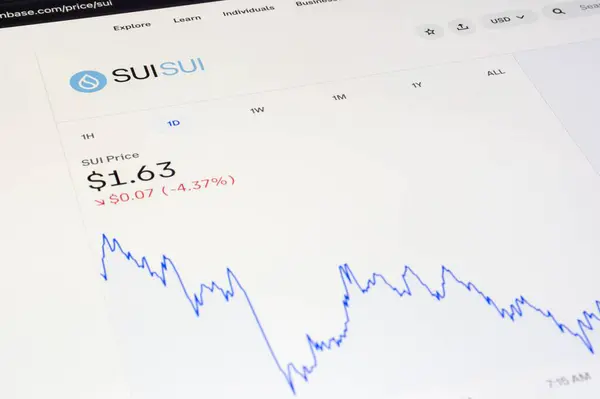Understanding SUI Crypto: An Overview of Its Significance
SUI Crypto is a decentralized platform that aims to facilitate the creation and management of digital assets, leveraging blockchain technology to ensure transparency, security, and efficiency. The platform has gained significant traction due to its innovative structure that allows users to customize their tokenization processes. SUI Crypto’s significance extends beyond just a cryptocurrency; it embodies a broader movement towards democratizing finance and empowering users with control over their digital assets.
At its core, SUI Crypto presents a unique proposition in the crypto ecosystem—its emphasis on scalability and user-centric design sets it apart from traditional cryptocurrencies like Bitcoin and Ethereum. This innovative approach has attracted the interest of developers, investors, and users, positioning SUI Crypto as a potential game-changer in the digital asset landscape. SUI Crypto’s architecture supports high transaction throughput and low latency, making it an attractive option for both retail and institutional participants in the market.
One of the pillars of SUI Crypto’s operation is its robust governance framework, which allows stakeholders to participate actively in decision-making processes. This model aligns with the decentralized ethos of blockchain technology, fostering an inclusive environment where user feedback is integral to the platform’s evolution. As more individuals and organizations engage with SUI Crypto, it raises important questions about its legal status and compliance within the United States, especially given the complex regulatory landscape surrounding cryptocurrencies.
Understanding SUI Crypto’s role in the broader financial ecosystem is vital for stakeholders who seek to navigate the challenges posed by regulatory scrutiny. As the platform continues to evolve and capture market interest, evaluating its American status becomes paramount for ensuring compliance while maximizing its potential benefits for users and investors alike.
The Legal Landscape of Cryptocurrency in the U.S.
Navigating the legal landscape of cryptocurrency in the United States is a formidable challenge, characterized by a patchwork of regulations that vary by state and federal jurisdiction. The lack of a unified regulatory framework creates uncertainty for crypto projects, including SUI Crypto. The primary regulatory bodies involved in overseeing cryptocurrencies are the Securities and Exchange Commission (SEC) and the Commodity Futures Trading Commission (CFTC). Each agency has its criteria for determining how digital assets are classified and regulated, complicating compliance efforts for cryptocurrency entities.
For instance, the SEC has taken the stance that many cryptocurrencies, particularly those that offer Initial Coin Offerings (ICOs), should be classified as securities under the Howey Test. This landmark Supreme Court case established a standard for determining whether an asset qualifies as an investment contract. To date, notable cases—such as the SEC vs. Ripple Labs—highlight the ongoing scrutiny that crypto projects face when classified as securities, impacting their ability to operate freely in the U.S. market.
Conversely, the CFTC considers certain cryptocurrencies, like Bitcoin, to be commodities, which subjects them to different regulatory requirements. This bifurcation in the regulatory framework means that SUI Crypto must carefully evaluate its classification and compliance strategy to avoid potential legal repercussions. Additional regulations from the Financial Crimes Enforcement Network (FinCEN) impose anti-money laundering (AML) and know-your-customer (KYC) obligations on cryptocurrency exchanges, further complicating the operational landscape for projects like SUI Crypto.
Given this complex legal environment, projects must engage in thorough legal evaluations and seek professional guidance to clarify their standing under U.S. laws. The implications of non-compliance can be severe, ranging from hefty fines to operational shutdowns. Therefore, understanding the legal landscape is the first step for SUI Crypto and similar projects aiming to secure legitimacy and foster trust among users and investors.
Evaluating SUI Crypto’s Compliance with U.S. Regulations
Compliance with U.S. regulations is crucial for SUI Crypto to thrive in the American market. The evaluation process begins with determining whether SUI Crypto’s tokens are classified as securities or commodities. If classified as a security, SUI Crypto would face stringent regulations, including registration requirements and detailed disclosures to protect investors. As mentioned earlier, the SEC’s application of the Howey Test becomes central in this regard. SUI Crypto must analyze its token structure, utility, and potential investment risks to ascertain its legal status.
Moreover, SUI Crypto must ensure adherence to AML and KYC regulations enforced by FinCEN. This involves implementing robust systems to verify the identity of users and monitor transactions for suspicious activities. Given the decentralized nature of cryptocurrencies, striking a balance between user privacy and regulatory compliance can be challenging. SUI Crypto must adopt a proactive approach in developing compliance protocols that align with federal and state regulations while maintaining user trust.
Another aspect of compliance involves tax obligations. The Internal Revenue Service (IRS) classifies cryptocurrencies as property for tax purposes, meaning that gains from cryptocurrency transactions may be subject to capital gains taxes. SUI Crypto users must be made aware of their tax responsibilities, and the platform may need to provide resources or tools to assist them in reporting their transactions accurately.
To navigate these complex regulatory requirements, SUI Crypto may benefit from engaging legal counsel experienced in cryptocurrency law. Legal experts can assist in drafting compliance policies, conducting risk assessments, and liaising with regulators to ensure SUI Crypto’s operations adhere to the evolving legal landscape. By taking a proactive approach to compliance, SUI Crypto can establish a solid foundation for growth and innovation in the U.S. market.
Key Jurisdictional Challenges for SUI Crypto in America
SUI Crypto’s journey through the American legal landscape is fraught with jurisdictional challenges that could impede its growth and operational efficiency. One of the primary hurdles stems from the varying regulations across states, creating a multi-jurisdictional environment that can be difficult to navigate. For instance, while some states, like Wyoming, have embraced blockchain technology through favorable legislation, others impose stricter regulations that could stifle innovation. This inconsistency presents logistical challenges for SUI Crypto in designing a compliance strategy that accommodates diverse state laws.
The decentralized nature of cryptocurrencies further complicates jurisdictional issues. Unlike traditional businesses that operate within defined geographical boundaries, SUI Crypto functions in a global network, potentially exposing it to international laws and regulations. It raises questions about how U.S. regulations apply to digital assets that may be traded or accessed globally. Jurisdictional ambiguity can lead to conflicts with foreign regulations, resulting in uncertainty about legal compliance and operational feasibility.
Another significant jurisdictional challenge arises from the classification of tokens. The lack of clarity on whether SUI Crypto’s tokens are securities, commodities, or utility tokens creates a precarious position for the platform. If regulators classify SUI Crypto’s tokens as securities, it could be subject to stringent regulations that limit its ability to operate or raise funds. Conversely, being recognized solely as a utility token might exempt SUI Crypto from certain regulations but could also impact investor confidence and market perception.
Moreover, enforcement actions from regulatory bodies can create chilling effects on existing and emerging blockchain projects. For example, the SEC’s aggressive stance on enforcement, as evidenced by its actions against high-profile projects, has led many developers to reconsider their strategies. This regulatory environment can disincentivize innovation and investment within the cryptocurrency sector, making it imperative for SUI Crypto to stay informed and adaptable in the face of changing regulations.
Legal Precedents Affecting SUI Crypto’s Status
Legal precedents significantly influence the status of cryptocurrencies like SUI Crypto within the American legal framework. One of the most notable cases is the SEC vs. Ripple Labs, which brought critical attention to the classification of cryptocurrencies. The case hinges on whether Ripple’s token, XRP, is a security under the Howey Test. The ongoing litigation highlights the complexities of regulatory interpretation and the potential consequences for projects that fail to meet compliance requirements.
Another relevant case is the SEC vs. Telegram Group Inc., where the court ruled that Telegram’s ICO for its blockchain project was indeed an unregistered securities offering. This case serves as a cautionary tale for cryptocurrency projects, emphasizing the importance of regulatory compliance and the need for clarity in token offerings. The implications of such precedents extend beyond Ripple and Telegram, as they set benchmarks for how other projects, including SUI Crypto, might be treated in the eyes of regulators.
Additionally, the CFTC vs. Bitfinex case, where the CFTC charged the crypto exchange for offering unregistered trading of cryptocurrency derivatives, emphasizes the need for proper registration and compliance with federal regulations. This case reinforces the notion that regulatory bodies are increasingly vigilant in monitoring cryptocurrency activities, which could impact SUI Crypto’s operational strategy if it engages in derivative trading or offers similar services.
These legal precedents underscore the need for SUI Crypto to adopt a proactive and informed approach to compliance. By understanding the implications of these cases, SUI Crypto can better navigate the regulatory landscape and foster a culture of compliance that prioritizes legal integrity while encouraging innovation and growth in the cryptocurrency space.
Potential Implications of Federal Regulations on SUI Crypto
Federal regulations have the potential to significantly impact SUI Crypto’s operations, governance, and market perception. As the regulatory landscape evolves, the introduction of comprehensive federal legislation could lead to clearer guidelines for cryptocurrency projects. Such regulations might standardize compliance requirements across states, thereby reducing the complexity of navigating a patchwork regulatory framework. For SUI Crypto, this could facilitate smoother operations while allowing it to concentrate on innovation and user engagement.
However, stringent federal regulations could also pose challenges for SUI Crypto. If regulations mandate heavy compliance burdens, such as extensive reporting requirements or high registration costs, it may limit the platform’s ability to scale efficiently. Moreover, increased regulatory scrutiny may dissuade potential investors who are wary of the regulatory risks associated with cryptocurrencies. This scenario could hamper the growth of SUI Crypto and impact its market capitalization.
The evolving federal stance on cryptocurrencies also influences user sentiment and trust in digital assets. As regulators refine their approach, the perception of cryptocurrencies may shift, impacting adoption rates and user engagement. If SUI Crypto is perceived as a compliant and trustworthy platform, it could attract a broader audience, including institutional investors who are increasingly entering the cryptocurrency space. Conversely, any negative regulatory developments could deter users from engaging with the platform.
Furthermore, the involvement of federal agencies like the IRS in the cryptocurrency space raises potential tax implications for SUI Crypto users. As cryptocurrencies become more mainstream, users may face increased scrutiny regarding tax reporting and obligations. SUI Crypto may need to develop resources or partnerships to assist users in navigating these complexities. By anticipating potential regulatory changes and their implications, SUI Crypto can position itself as a responsible player in the cryptocurrency ecosystem, fostering trust and encouraging user adoption.
Analyzing Case Studies: SUI Crypto in American Courts
Analyzing potential case studies involving SUI Crypto within American courts reveals insights into its legal standing and regulatory compliance. One possible scenario involves a user claiming that SUI Crypto’s tokens constitute a security under the Howey Test, leading to litigation against the platform. The outcome of such a case could hinge on how the court interprets the utility and function of SUI Crypto’s tokens. A favorable ruling could affirm SUI Crypto’s position as a compliant entity, while an unfavorable ruling might compel it to reconfigure its token structure or revise its business model.
Another case study could involve a regulatory agency, such as the SEC or CFTC, initiating enforcement actions against SUI Crypto for alleged non-compliance with federal regulations. This scenario would likely focus on the nature of SUI Crypto’s offerings and the classification of its tokens. Legal battles in this context could have far-reaching consequences, not only for SUI Crypto but also for the broader cryptocurrency industry, as they could set precedents for how other projects approach regulatory compliance.
Moreover, SUI Crypto could find itself involved in class-action lawsuits from users who allege fraud or misrepresentation regarding the platform’s offerings. Such cases underscore the importance of transparent communication and thorough disclosures to users. How SUI Crypto navigates legal challenges in this domain could influence its reputation and user trust, making it essential to prioritize ethical practices and transparency in its operations.
Ultimately, these hypothetical case studies illustrate the precarious nature of operating within the U.S. legal landscape for cryptocurrency projects like SUI Crypto. By proactively addressing potential legal challenges and enhancing compliance measures, SUI Crypto can mitigate risks and position itself positively in the eyes of regulators and users alike.
Future Outlook: SUI Crypto and Evolving Legal Frameworks
Looking ahead, the future of SUI Crypto within the American legal landscape appears to be shaped by evolving regulatory frameworks. As lawmakers and regulatory bodies gain a deeper understanding of cryptocurrencies, there is potential for the establishment of more comprehensive and clear regulations. Such advancements could create a more favorable environment for SUI Crypto, allowing it to operate with greater certainty and support innovation in the digital asset space.
The growing trend of public consultations and stakeholder engagement by regulatory bodies signals a shift towards more inclusive policymaking. SUI Crypto can leverage this opportunity to participate in discussions and advocate for regulations that foster innovation while ensuring user protection. By engaging with lawmakers and regulators, SUI Crypto can position itself as a thought leader in the industry, potentially influencing the development of favorable regulatory frameworks.
Moreover, the rise of decentralized finance (DeFi) and non-fungible tokens (NFTs) is likely to prompt regulators to reconsider existing frameworks that may not adequately address the unique characteristics of these innovations. As SUI Crypto continues to evolve, it may explore the integration of DeFi functionalities which can broaden its appeal and use cases. However, it must remain vigilant about the accompanying regulatory implications and ensure compliance with any emerging guidelines.
In conclusion, the future outlook for SUI Crypto in America is intertwined with the trajectory of cryptocurrency regulations. By adopting a proactive and adaptive approach to compliance, engaging with regulatory developments, and fostering a culture of transparency, SUI Crypto can navigate the complexities of the legal landscape and unlock new opportunities for growth and success in the dynamic world of digital assets.
This article serves as a comprehensive guide for stakeholders interested in understanding the legal intricacies surrounding SUI Crypto’s status in America. By examining the current legal landscape, compliance requirements, jurisdictional challenges, and potential future developments, readers can gain valuable insights into the complexities of cryptocurrency regulation in the United States.


